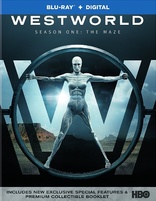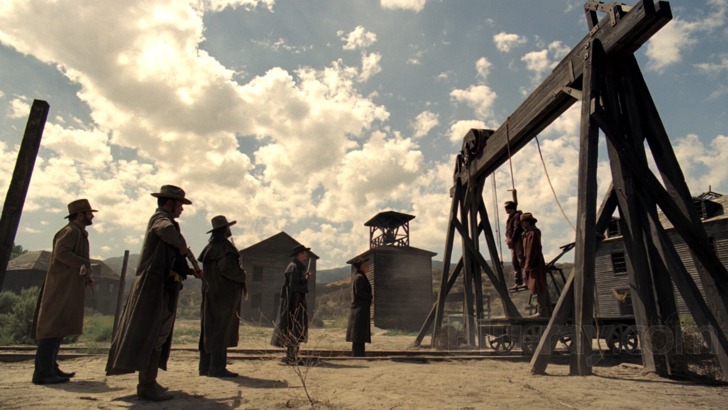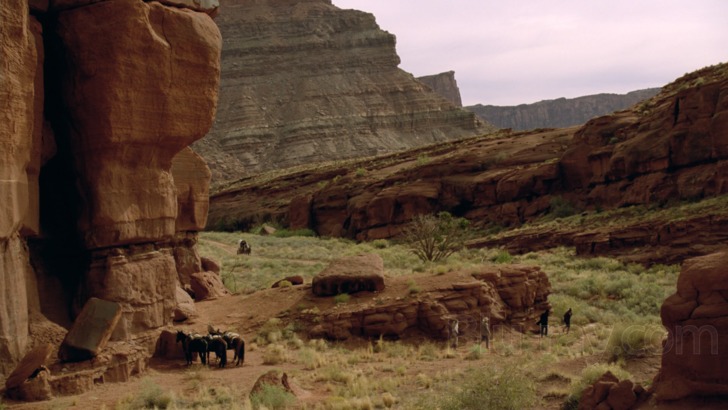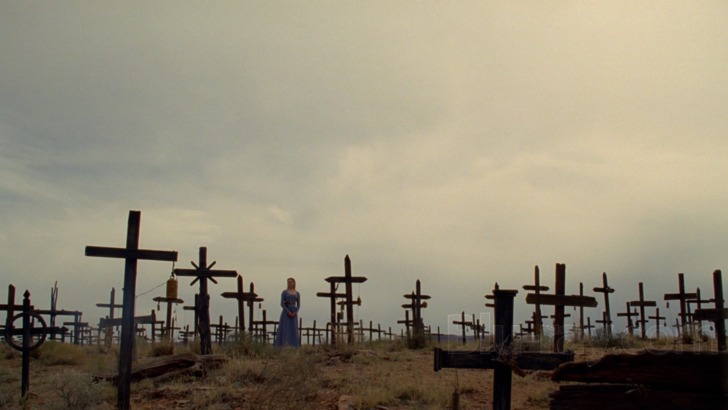Westworld: Season One Blu-ray Movie
HomeWestworld: Season One Blu-ray Movie 
Blu-ray + UV Digital CopyWarner Bros. | 2016 | 619 min | Not rated | Nov 07, 2017

Movie rating
8.2 | / 10 |
Blu-ray rating
| Users | 5.0 | |
| Reviewer | 4.0 | |
| Overall | 4.0 |
Overview
Westworld: Season One (2016)
Visitors to a futuristic theme park populated by artificial beings experience Wild West adventures -- and more. Based on the 1973 film by Michael Crichton.
Starring: Evan Rachel Wood, Thandiwe Newton, Jeffrey Wright, James Marsden, Ben BarnesDirector: Jonathan Nolan, Frederick E.O. Toye, Jonny Campbell, Richard J. Lewis, Michelle MacLaren
| Sci-Fi | Uncertain |
| Mystery | Uncertain |
| Western | Uncertain |
| Drama | Uncertain |
Specifications
Video
Video codec: MPEG-4 AVC
Video resolution: 1080p
Aspect ratio: 1.78:1
Original aspect ratio: 1.78:1
Audio
English: DTS-HD Master Audio 5.1 (48kHz, 16-bit)
French: Dolby Digital 5.1 (640 kbps)
Spanish: Dolby Digital 5.1 (640 kbps)
Portuguese: Dolby Digital 5.1
Subtitles
English SDH, French, Portuguese, Spanish, Danish, Dutch, Finnish, Norwegian, Swedish
Discs
Blu-ray Disc
Three-disc set (3 BDs)
UV digital copy
Packaging
Slipcover in original pressing
Playback
Region A, B (C untested)
Review
Rating summary
| Movie | 4.0 | |
| Video | 5.0 | |
| Audio | 4.5 | |
| Extras | 2.5 | |
| Overall | 4.0 |
Westworld: Season One Blu-ray Movie Review
These Violent Delights
Reviewed by Michael Reuben November 12, 2017Westworld is the latest watercooler series from HBO, the pay cable network that brought us The
Sopranos, Six Feet Under,
Deadwood and
Game of Thrones. A
re-imagining of Michael
Crichton's 1973 thriller of the same
name, the series is
lavishly mounted, impeccably cast and
produced with all the benefits of the latest in both digital and practical effects. According to
HBO, Westworld was the highest rated inaugural season in their history of original programming.
The creators of this new vision are the husband-and-wife team of Jonathan Nolan and Lisa Joy.
Nolan, who also directed the pilot and season finale, is the brother of director Christopher and the
author of the story that inspired Memento
, one of the
twistiest puzzle films ever made.
Nolan/Joy's Westworld is also a puzzle—more accurately, a series of puzzles, one after another
and one inside another. Fans and newcomers alike can now revisit (or discover for the first time)
the season's many mysteries in a handsome Blu-ray set from Warner Brothers Home
Entertainment. For those who have made the leap to 4K, Warner is also releasing Westworld in a
UHD version, which makes it,
as far as I know, the
first TV drama to be presented in that format.

Like many contemporary TV series, Westworld is loaded with twists and reveals, some small and some enormous, so that it's effectively impossible to discuss the show in depth, or even to offer episode summaries, without straying into spoiler territory. For those new to Nolan/Joy's inventive creation, let me offer a general introduction that will be, to the best of my ability, spoiler-free.
As in Michael Crichton's original film, Westworld envisions a high-tech theme park where visitors can plunge themselves into an alternative world more immersive than any virtual reality simulation. For the low, low price of $40,000 a day, the "guests" (as they're known to the park staff) assume alternate identities as visitors to a Western landscape that's equal parts John Ford and Deadwood. Both the towns and the expansive surrounding territory contain a huge population of android "hosts", who are indistinguishable from humans and have been programmed with elaborate narrative "loops", which they repeat over and over. Guests interact with the hosts however they please, whether through gun battles on the street, brawls in smoky barrooms or pornographic sex in the brothel run by Maeve (Thandie Newton)—or any other adventure that strikes a particular guest's fancy. Weapons have been engineered not to injure the guests, but they can "kill" a host, who will be quietly retrieved and repaired by the staff, then returned to his or her loop. Hosts' memories are routinely wiped, so that they have no recall of the countless acts of violence committed against them, whether by the guests or by each other in loops of mass host-on-host pillage and murder staged for the guests' amusement.
All of these elements have been taken from Crichton's film, but Crichton was writing in an analog age. Nolan/Joy have reinvented his scenario for the digital world of the 21st Century. Their robots have been programmed to improvise, within narrowly defined parameters, so that they can adapt their behavior to changing circumstances and provide the guests with a more realistic experience. The parks' technicians control the hosts through voice commands and powerful iPad-like tablets that would have been unimaginable in the original Westworld's era. The interactions between staff and hosts are conducted through self-diagnostic conversations that routinely blur the line between human and host. The park is monitored not only through video feeds, but also through a real-time miniature digital simulation housed on one of the many levels of Westworld's subterranean headquarters. Other levels contain the sophisticated 3D printing operation that creates the hosts and the antiseptic glass cubicles where the robots are repaired—and where, when no one is looking, the staff sometimes takes liberties that are supposed to be reserved for paying guests.
While tracing the contours of this minutely realized environment, Westworld unwinds several key narrative strands. One is the essential question of what differentiates an A.I. from sentient life. When do robots acquire independent consciousness and a "soul"—and therefore the possibility of rebelling against the masters who have enslaved them? Crichton's film posed this question in the form of a thriller, as the machines seized control of the theme park and began slaughtering the human staff and guests, but the new Westworld takes a longer and more thoughtful route, tracing gradual awakenings and glimmers of consciousness. Central to this evolution is Dolores (Evan Rachel Wood), the oldest host in the park, who has spent countless days playing a sweet rancher's daughter and a damsel in distress. The series opens with Dolores undergoing evaluation by Bernard Lowe (Jeffrey Wright), the head of the programming division, but it quickly becomes clear that his interest in her programming extends beyond maintenance. (Hosts are typically interviewed and "diagnosed" in the nude, but Bernard talks to Dolores fully clothed.) It is Bernard who first spots early signs of change in the hosts, and his interest in exploring the phenomenon will bring him into conflict with his boss, the visionary Dr. Robert Ford (Anthony Hopkins), founder of the park and creator of the hosts—who always seems to be holding back a secret.
A second narrative strand focuses on the guests and the effect of their being released from any consequences for their actions. Two of the key players are William (Jimmi Simpson) and Logan (Ben Barnes), who arrive in Westworld for a sort of bachelor party before William marries Logan's sister. Logan is a returnee, who plunges enthusiastically into the park's indulgences, but William is clearly uncomfortable with the very concept of Westworld. When he is greeted upon arrival by a comely host named Angela (Talulah Riley) who declares her immediate availability for sex, William declines, while Logan emerges from a similar changing room zipping up his fly. But William too will eventually be sucked into one of the park's many narratives, because Westworld offers something for all tastes. As one guest observes, the park reveals who you really are—for better or for worse (usually worse).
A third narrative strand involves control over Westworld, in multiple forms. Control of Delos, the company that owns Westworld and in which Logan's family is poised to make a sizeable investment. Control over the park's operations, which Dr. Ford zealously guards from interference by operations director Theresa Cullen (Sidse Babett Knudsen) and the Delos board of directors. Control over the hosts' many loops, which are constantly being revised and tweaked by Lee Sizemore (Simon Quarterman), the park's narrative director, who is frustrated when his proposed flights of fancy are overruled by Dr. Ford, who is privately is developing a secret "new narrative". And, of course, control over the hosts, which is the special concern of Elsie Hughes (Shannon Woodward), a rising star in the programming department who specializes in tracking aberrant behavior. Any behavior that can't be explained or eliminated results in a host's being pulled from duty and shipped to the cold storage level, where row upon row of inert bodies are lined up as if waiting for something (or someone).
At the core of Westworld's many mysteries is a puzzle known as "the maze". It's the special obsession of a mysterious Man in Black, who is played by Ed Harris with a knowing nod to the deadly robot gunslinger portrayed by Yul Brynner in Crichton's original film. Little can be said about the Man in Black except to stress that he is one of Nolan/Joy's most interesting and original creations. After entering the series with a vicious assault in the pilot episode, the Man in Black embarks on a relentless quest for self-awareness encapsulating everything that makes Westworld both fascinating and infuriating.
Westworld has its flaws. Some of the character development doesn't quite line up by the time we reach Episode 10, where many (but not all) of the season's riddles are answered. Nolan/Joy have acknowledged that they had to shut down production for several months while they worked out the intricacies of the last few episodes, which suggests that they began filming without a complete set of narrative blueprints—and it shows. Also, the creative team too often succumbs to the temptation to indulge their fantasies almost as much as the Westworld guests, gratuitously exploiting the freedom of premium cable to fill the screen with explicit sex and violence. In Episode 5, the production stages an orgy resembling a frontier version of the masked party in Eyes Wide Shut—but without the digital figures discreetly blocking one's view that Stanley Kubrick had to add to get an R rating. The sequence is eye-catching but contributes nothing to the plot. The same can be said of the violent train shootout in Episode 7, which is little more than an alternate version of the bloody saloon robbery in the pilot. The earlier sequence is an apt introduction to the theme park's embrace of excess, while the later one is just more of the same. In the post-Game of Thrones era, it seems that showrunners feels the need to keep topping each other (and themselves), but maybe they should take a lesson from Lisa Joy's rueful comments about a particularly gruesome scene in the series finale, which Joy admits she can't bear to watch. As she then acknowledges, some things are better left on the page.
Westworld: Season One Blu-ray Movie, Video Quality 

Westworld's cinematography has been widely covered in industry publications, because the show
is among the increasingly rare projects shot on film (though, admittedly, the negative was
immediately scanned for digital post-production). Nolan/Joy wanted the series to evoke the
visual style of classic Westerns from John Ford, Clint Eastwood and Sergio Leone, and they
turned to director of photography Paul Cameron (a frequent collaborator of director Tony Scott)
to establish Westworld's cinematic vocabulary in its pilot episode. High-resolution stills of
Cameron's work were kept on the set for reference by the revolving team of DPs who
photographed the remaining episodes, thereby ensuring a consistent look and feel.
Westworld shifts back and forth between softly warm earth tones in the fantasy park above (much
of it photographed against the striking Utah locations where Ford shot The Searchers) and the
steely blues and grays of the management and manufacturing facilities below. The staff's chilly
environments are punctuated by bright swaths of red, notably on the sleeves and aprons of the
repair techs, on the walls leading to and surrounding the observation room where the park's
activities are monitored on a miniature real-time simulation, and, of course, in the blood flowing
from injured hosts. The reds are a colorful contrast to the rest of the underground facilities,
providing stimulation in otherwise visually sterile surroundings.
Warner has spread the ten one-hour episodes of Westworld's first season over three 1080p, AVC-encoded BD-50s.
(The pilot and the
season finale both run over an hour.) The image is
consistently superb, with excellent sharpness, detail, colors and densities, solid blacks and a
complete absence of noise or distortion. The combination of modern film stocks and digital post-production has rendered the
film's grain pattern
almost invisible, but it's there if one looks
closely (very closely). The more notable indication of the series' filmic origins is the refined
textures of the image, in both panaromic views of the expansive park and cavernous workshops
and in tight closeups on faces. The visuals of Westworld provide a convincing demonstration of
the continued vitality of film as a cinematic medium, achieving the many virtues of digital
capture without sacrificing the warmth of celluloid. The creative team's accomplishment has
been effectively transferred to Blu-ray despite average bitrates that consistently hover around
19.8 Mbps, a figure that might raise a red flag, but superior compression and authoring appear to
have avoided any issues.
Westworld: Season One Blu-ray Movie, Audio Quality 

Westworld was shown on HBO with a 5.1 soundtrack, which is encoded here in lossless DTS-HD MA. The mix is full of atmospheric surround cues, effectively re-creating the vast outdoor spaces of the park as well as the industrial whispers of the maintenance and management areas. Dynamic range is broad, lending authority to gun battles and other sonic accompaniments to violence. (The Gatling gun in Episode 7 is particularly thunderous.) Discrete rear channel effects occur routinely, while the dialogue remains firmly anchored to the front, clearly articulated and well-prioritized. The track is especially effective in reproducing the mixture of instrumental and electronic sounds employed by composer Ramin Djawadi (Pacific Rim and Game of Thrones), whose haunting theme opens each episode and whose use of a tinkling player piano is one of the series' recurrent motifs. The soundtrack also employs the occasional contemporary selection repurposed by Djawadi's arrangements, which can be jarring—and that is presumably the point. When an Old West shootout is set to an instrumental version of the Rolling Stones' "Paint It Black", the collision of time periods makes you sit up and take notice.
Westworld: Season One Blu-ray Movie, Special Features and Extras 

Some of these extras appeared on HBO's streaming service during the show's initial broadcast,
notably "The Big Moment" featurettes, which are quick takes by the cast and creators on several
of the series' major twists (and, for that reason, contain major spoilers). Some features on the
streaming service have not been carried over, notably the trailers and previews.
- Disc 1
- About the Series (1080p; 1.78:1; 2:12): This brief introduction includes short interviews with actors Thandie Newton, Evan Rachel Wood and James Marsden, as well as executive producers Nolan, Joy and J.J. Abrams.
- An Invitation to the Set (1080p; 1.78:1; 2;16): Despite the title, this is really just an alternative introduction to the series, with many of the same interviewees and few new ones.
- The Big Moment
- Teddy Versus the Man in Black (1080p; 1.78:1; 1:55)
- A Host Self-Sabotages (1080p; 1.78:1; 1:55)
- Welcome to Westworld (1080p; 1.78:1; 7:43): This is a somewhat longer introduction to the series, and it includes behind-the-scenes footage of the cast and crew at work.
- Realizing the Dream: First Week on the Set of Westworld (1080p; 1.78:1; 11:22): On location in Utah, where many of the exteriors were filmed.
- Imagining the Main Title (1080p; 1.78:1; 14:08): Nolan, Joy, composer Ramin Djawadi and graphic design executive Jennifer Hall discuss the creation of the foreboding title sequence.
- Disc 2
- Reality of A.I.: Westworld (1080p; 1.78:1; 4:30): Thoughts on the reality of robots by Nolan, Joy, J.J. Abrams and cast members.
- The Big Moment
- Maeve Gets an Answer (1080p; 1.78:1; 1:38)
- Bernard Faces an Unlikely Saboteur (1080p; 1.78:1; 1:23)
- Dr. Ford's Blood Sacrifice (1080p; 1.78:1; 1:38)
- Gag Reel (1080p; 1.78:1; ): Brief but memorable.
- Disc 3
- The Big Moment
- The Truth About Bernard (1080p; 1.78:1; 2:25)
- Dr. Ford's New Narrative (1080p; 1.78:1; 3:53)
- The Key to the Chords (1080p; 1.78:1; 8:05): Nolan, Joy and composer Ramin Djawadi discuss the series' recurring use of a player piano as both symbol and musical accompaniment.
- Crafting the Narrative (1080p; 1.78:1; 29:16): Nolan and Joy provide commentary for select scenes from the season finale.
- Corporate Guidebook: This booklet is a mock "handbook for new employees" of Westworld. (Since Warner did not provide a separate copy of the standard Blu-ray, I cannot verify that this item is included, but I am told that it is.)
Westworld: Season One Blu-ray Movie, Overall Score and Recommendation 

A remake of Westworld was already under discussion when I reviewed the original film's Blu-ray
four and a half years ago. It was a long time in development, but Nolan/Joy have delivered
something complex, multilayered and ideally suited to multiple viewings. Warner's Blu-rays
provide an excellent rendition of the series' sound and visuals, which, like the titular theme park
itself, combine a retro sensibility with the latest technology. Highly recommended.
Other editions
Westworld: Other Seasons

Westworld: Season One 4K
2016

Westworld: Season One
2016

Westworld: Season One 4K
2016

Westworld: Season One
with Ready Player One Movie Money
2016

Westworld: Season Two
2018

Westworld: Season Two 4K
2018

Westworld: Season Two 4K
2018

Westworld: Season Two
with Bonus Disc
2018

Westworld: Season Two
2018

Westworld: Season Two
2018

Westworld: Season Three 4K
2020

Westworld: Season Three
2020

Westworld: Season Three 4K
2020

Westworld: Season Three
2020

Westworld: Season Four
2022

Westworld: Season Four 4K
2022
Similar titles
Similar titles you might also like

Blade Runner 2049 4K
2017

Atlas Shrugged: Part I
2011

The Expanse: The Complete Series
2015-2022

Ad Astra
2019

400 Days
2015

Riverworld
2010

Dollhouse: Season 2
2010

Replicas
2018

Rememory
2017

Fahrenheit 451
2018

Glass 4K
2019

Arrival 4K
2016

Ex Machina 4K
2015

Firefly: The Complete Series
15th Anniversary Edition
2002

Moon
2009

Caprica
2009-2010

Extant: The First Season
2014

Voyagers
2021

The Creator 4K
2023

Atlas Shrugged Part III: Who Is John Galt?
2014